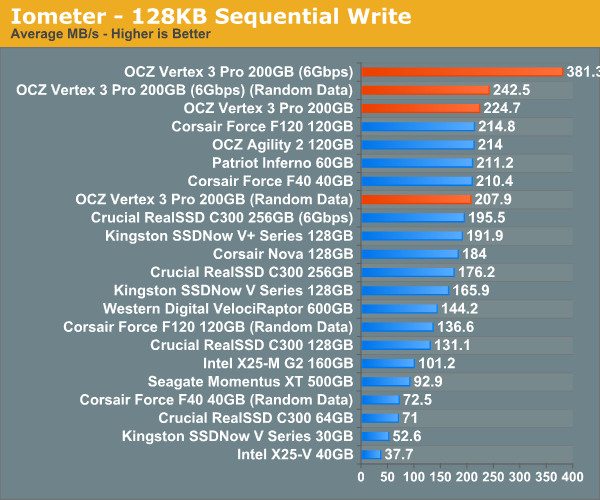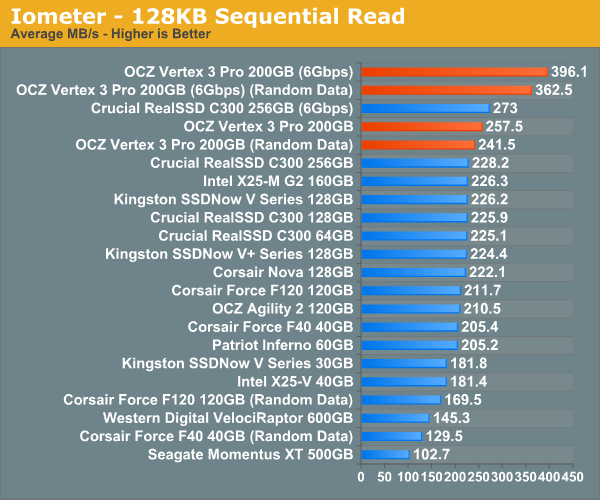OCZ Vertex 3 Pro Preview: The First SF-2500 SSD
by Anand Lal Shimpi on February 17, 2011 3:01 AM ESTSequential Read/Write Speed
To measure sequential performance I ran a 3 minute long 128KB sequential test over the entire span of the drive at a queue depth of 1. The results reported are in average MB/s over the entire test length.

This is pretty impressive. The new SF-2500 can write incompressible data sequentially at around the speed the SF-1200 could write highly compressible data. In other words, the Vertex 3 Pro at its slowest is as fast as the Vertex 2 is at its fastest. And that's just at 3Gbps.
The Vertex 3 Pro really shines when paired with a 6Gbps controller. At low queue depths you're looking at 381MB/s writes, from a single drive, with highly compressible data. Write incompressible data and you've still got the fastest SSD on the planet.
Micron is aiming for 260MB/s writes for the C400, which is independent of data type. If Micron can manage 260MB/s in sequential writes that will only give it a minor advantage over the worst case performance of the Vertex 3 Pro, and put it at a significant disadvantage compared to OCZ's best case.
Initially, SandForce appears to have significantly improved performance handling in the worst case of incompressible writes. While the old SF-1200 could only deliver 63% of its maximum performance when dealing with incompressible data, the SF-2500 holds on to 92% of it over a 3Gbps SATA interface. Remove the SATA bottleneck however and the performance difference returns to what we're used to. Over 6Gbps SATA the SF-2500 manages 63% of maximum performance if it's writing incompressible data.
Note that the peak 6Gbps sequential write figures jump up to around 500MB/s if you hit the drive with a heavier workload, which we'll see a bit later.

Sequential read performance continues to be dominated by OCZ and SandForce. Over a 3Gbps interface SandForce improved performance by 20 - 40%, but over a 6Gbps interface the jump is just huge. For incompressible data we're talking about nearly 400MB/s from a single drive. I don't believe you'd even be able to generate the workloads necessary to saturate a RAID-0 of two of these drives on a desktop system.










144 Comments
View All Comments
Chloiber - Thursday, February 17, 2011 - link
It's correct, Anand answered the exact same question already on page 1/2 of the comments.7Enigma - Thursday, February 17, 2011 - link
Yup, saw that on my second read through. A little clarification in the article would have made it a bit more explainable but at least the numbers are right.teldar - Thursday, February 17, 2011 - link
Hope this gets seen.I used to go to a site frequently for info on drive reliability.
storagereview.com
I don't believe its really being updated anymore. I would love to side you be able to integrate a site like theirs (or theirs completely) into here.
argosreality - Thursday, February 17, 2011 - link
They've been updating the site for the last six months or so with new reviews. Actually, they just reviewed the new Vertex2 drives with 25nm flashtomoyo - Friday, February 18, 2011 - link
Ya storagereview is quite alive now. They were dead for over a year, but I'm glad to have another good source of hdd/ssd info again.KenPC - Thursday, February 17, 2011 - link
OCZ needs a distraction - NOWSo serve up a prototype (even without a case yet) drive and get fabulous bench results and lots of press to drown out the behind the scenes downgrading of many of the on-market products.
Yes, this new controller/architecture for this particular prototype is faster. Yes, it appears to be very promising technology in the SSD space.
But now folks will be using THIS prototype review to measure the purchase decisions for drives sold months from now that may/may not have the same performance
MeSh1 - Thursday, February 17, 2011 - link
Wow, thats some tasty hardware :). 400GB @ $1350. The Revo X22 480GB is just under that, hmm..... decisions. Revo Drive uses SF1200 I wonder if they can slap a SF200 on the Revo :)Breit - Friday, February 18, 2011 - link
you can bet on that. ocz will definitely roll out a new revodrive with sf2000 on it when the time comes, trust me. :)geniekid - Thursday, February 17, 2011 - link
Don't know if anyone from AT will get this far in the comments, but...1) I like how the beginning of the article rehashes how SSDs work instead of linking back to earlier articles. The redundancy makes it a lot easier to read the article.
2) I think the real world usage of these things is invaluable. Theoretical limits almost never ever mirror real world usage. *Thumbs up*
TrackSmart - Friday, February 18, 2011 - link
I agree completely on the REAL WORLD tests. Looking at the PCMark Vantage scores, it's clear that the incredible speeds of the Vertex 3 will only yield marginal gains in *total system performance* compared to the current crop of SSDs (Agility 2, Vertex 2, etc). Hopefully the price of the new drives will be similar to the old ones. Or lower, forcing even more affordable pricing on the existing, fast-enough models.